| Srl | Item |
| 1 |
ID:
101813
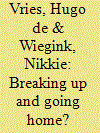

|
|
|
|
|
| Publication |
2011.
|
| Summary/Abstract |
This article argues that the common assumptions that lie behind efforts to break the command and control structures of armed groups, and working on 'community reintegration', are not necessary prerequisites for a successful disarmament, demobilization and reintegration (DDR) process. Former fighters may encounter troubles going home, as their communities of origin may not be as open to them as is often assumed. They may also have no other choice than to keep their military structures intact. However, this may not necessarily impede their social integration. In fact, the structures emerging from war may be relatively constructive for the socio-economic rehabilitation of former fighters.
|
|
|
|
|
|
|
|
|
|
|
|
|
|
|
|
| 2 |
ID:
101811
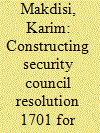

|
|
|
|
|
| Publication |
2011.
|
| Summary/Abstract |
This article argues that the 'war on terror' gave global meaning to the 2006 Israel-Lebanon war and to the construction of UN Security Council resolution 1701 that authorized the deployment of robust UN peacekeepers in southern Lebanon (UNIFIL). It uses a critical, discursive approach to argue that UN resolutions have embedded in them a particular, powerful discourse, in this case the 'war on terror'. This discourse grounded a global struggle for and against US domination of the region in a local power dispute in Lebanon between 2004 and 2008. It concludes that Israel's failure to defeat Hizbullah militarily resulted in resolution 1701 comprising two contradictory narratives that represented the battle for and against US domination, and that the subsequent battle for hegemonic articulation of this resolution weakened, rather than strengthened the Lebanese state during 2006-08, plunging Lebanon into internal strife until the signing of a national peace accord in Doha in May 2008.
|
|
|
|
|
|
|
|
|
|
|
|
|
|
|
|
| 3 |
ID:
101815


|
|
|
|
|
| Publication |
2011.
|
| Summary/Abstract |
Since 1989 the international community has been called on repeatedly to address the security dilemma posed by weak states. NATO has found this to be a particularly daunting task given that the organization's traditional resources make only a small contribution to providing security in post-conflict states. As a result the alliance has attempted to create a new capability that merges civilian and military efforts. This process has met with limited success in Afghanistan. This article examines the evolution of the comprehensive approach in NATO and specifically the UK's attempts to implement the comprehensive approach in the first Helmand campaign of 2006.
|
|
|
|
|
|
|
|
|
|
|
|
|
|
|
|
| 4 |
ID:
101814


|
|
|
|
|
| Publication |
2011.
|
| Summary/Abstract |
This article examines proposals for delegating internal security - policing - in peacekeeping missions to non-state institutions. It first outlines the putative benefits in doing so. It then examines the difficulties in implementing such a strategy - problems of choosing, monitoring and regulating non-state providers. The article argues that while adopting this strategy may, or may not, provide short-term benefits in terms of public safety, it represents an expansion of peacekeeping responsibilities that has unpredictable political consequences.
|
|
|
|
|
|
|
|
|
|
|
|
|
|
|
|
| 5 |
ID:
101816
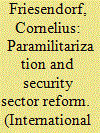

|
|
|
|
|
| Publication |
2011.
|
| Summary/Abstract |
An accelerating trend to establish paramilitarized security forces has been occurring in peace operations to help fill security gaps. But the practice is problematic from a security sector reform (SSR) point of view, because SSR aims at distinguishing between the military and the police and at promoting civilian policing. This article shows that while the SSR concept leaves room for paramilitarization, it demands much caution. The paramilitarization of regular police forces is incompatible with even a flexible interpretation of SSR principles. The US-driven paramilitarization of the Afghan National Police (ANP), reflecting a search for quick fixes, is a dramatic case in point.
|
|
|
|
|
|
|
|
|
|
|
|
|
|
|
|
| 6 |
ID:
101812
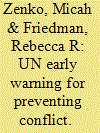

|
|
|
|
|
| Publication |
2011.
|
| Summary/Abstract |
Despite repeated calls for a coordinated UN early warning system for preventing conflict, early warning is currently performed piecemeal by seven UN bodies and one ad hoc initiative. Due to the difficulties inherent in the UN's structure - the transparency of the organization and member states' sensitivity about perceived encroachments on their sovereignty - the UN cannot, and arguably should not, develop a comprehensive early warning system for preventing conflict. Instead, the UN could improve its ability to analyse and absorb early warning information already in the system by: reforming the Executive Office of the Secretary-General; strengthening the early warning and assessment capacities within the aforementioned bodies; soliciting greater cooperation with the US intelligence community and regional organizations; and promoting enhanced inter-agency cooperation.
|
|
|
|
|
|
|
|
|
|
|
|
|
|
|
|
| 7 |
ID:
101817
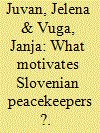

|
|
|
|
|
| Publication |
2011.
|
| Summary/Abstract |
This article is based on the results of longitudinal research on the motivations and expectations of members of the Slovenian Armed Forces participating in peace operations from 2003 to 2009. The analysis is based on three main approaches. The first is to distinguish between two groups of soldiers: those deployed to missions abroad on a voluntary basis, and those deployed to missions by order. The second approach is to distinguish between those deployed for the first time, and those who have already participated in peace support operations (PSOs) before. The third approach aims at distinguishing between three types of soldiers' motivation for PSOs according to Battistelli's typology. The importance of the different groups of motivation would to a certain degree also vary depending on the national culture, organizational culture and the individual soldier, as well as the time at which the survey was conducted: prior to deployment, during deployment or after returning home.
|
|
|
|
|
|
|
|
|
|
|
|
|
|
|
|